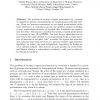Free Online Productivity Tools
i2Speak
i2Symbol
i2OCR
iTex2Img
iWeb2Print
iWeb2Shot
i2Type
iPdf2Split
iPdf2Merge
i2Bopomofo
i2Arabic
i2Style
i2Image
i2PDF
iLatex2Rtf
Sci2ools
123
Voted
CPM
2004
Springer
2004
Springer
Sorting by Reversals in Subquadratic Time
The problem of sorting a signed permutation by reversals is inspired by genome rearrangements in computational molecular biology. Given two genomes represented as two signed permutations of the same elements (e.g. orthologous genes), the problem consists in finding a most parsimonious scenario of reversals that transforms one genome into the other. We propose a method for sorting a signed permutation by reversals in time O(n n log n). The best known algorithms run in time O(n2 ), the main obstacle to an improvement being a costly operation of detection of so-called "safe" reversals. We bypass this detection and, using the same data structure as a previous random approximation algorithm, we achieve the same subquadratic complexity for finding an exact optimal solution. This answers an open question by Ozery-Flato and Shamir whether a subquadratic complexity could ever be achieved for solving the problem.
Combinatorics | Computational Molecular Biology | CPM 2004 | Signed Permutation | Subquadratic Complexity |
Related Content
| Added | 20 Aug 2010 |
| Updated | 20 Aug 2010 |
| Type | Conference |
| Year | 2004 |
| Where | CPM |
| Authors | Eric Tannier, Marie-France Sagot |
Comments (0)

